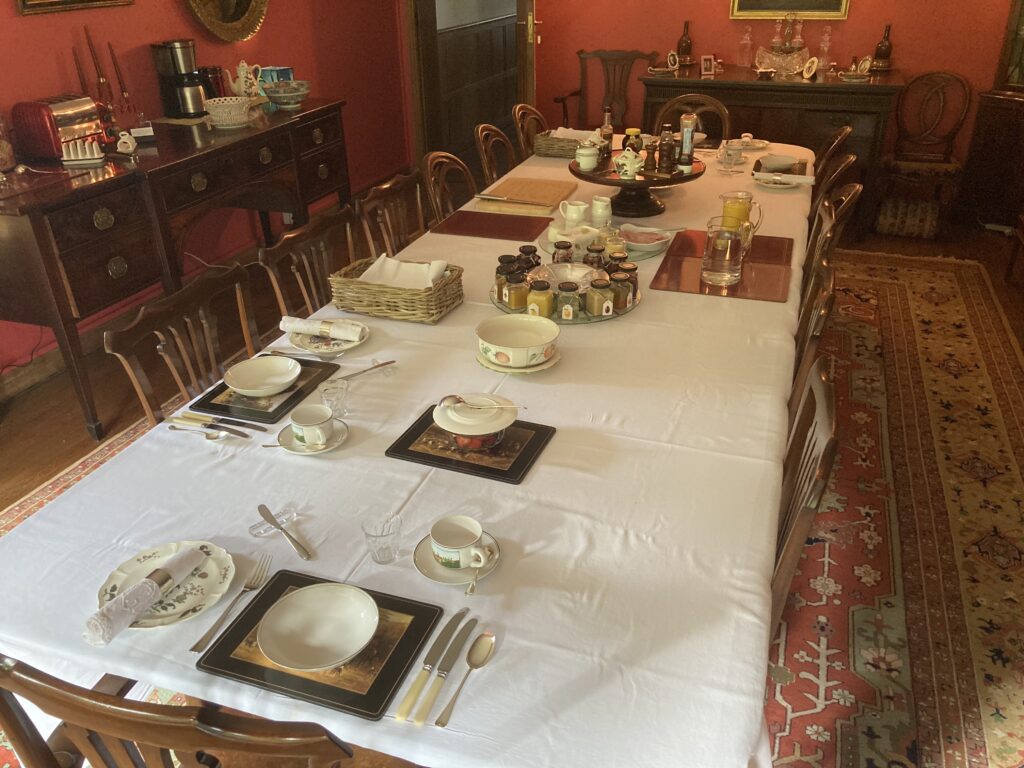Tuesday, July 20th, 2021

In the midst of a mediocre summer, we are suddenly enjoying a few days of warm weather. Today is as sunny as a perfect fried egg.
An English breakfast revolves around an egg. This central orb is usually surrounded by various satellites such as bacon, sausages, tomatoes and mushrooms. For a long time I was terrified of frying eggs. All too often the yolk would split on landing in the pan; the white would run off in strange directions in uncontrolled abandon; the yolk would cook too fast or not fast enough; bits of white would become rubbery while other bits remained raw; the list goes on… And once cooked, the fried egg would refuse to unstick itself from the pan and end up in pieces, an unsightly and unappealing mess on the guest’s plate. It would then have to be removed and put in the bin. Panic sets in as I must start all over again with a fresh egg in a different pan (which needs warming up, wasting precious minutes) at the same time as trying to prevent the rest of the breakfast from congealing, getting burnt or getting cold, juggling plates, pans, oven doors, and oven gloves. Oh, the stress! Tip: always put the egg on first when plating up, because it’s at that point when disasters are most likely to strike. At least that way you won’t be faced with a plateful of assorted, unsalvageable food items stained with yellow blotches that all have to be given to the cat. I speak from experience.
Back in 2018, when I first started this B&B, I bought a set of four tiny cast iron frying pans on eBay (see photo above of this morning’s egg being cooked in one of these mini-skillets). They measure 5 inches (13cm) across and are tailor made for fried eggs. But I didn’t dare to use them without first doing my research and then trying them out on family and friends rather than paying guests. So they remained in the cupboard for more than a year, earmarked for experimentation at some future date when I wasn’t so busy. Meanwhile I continued to use my ceramic, non-stick frying pans. These worked quite well, and certainly a lot better than, say, a stainless steel frying pan would, but they were by no means flawless. Such pans rely on their surface being absolutely pristine. Any invisible film or residue from a previous use will cause the whites of eggs to stick. I have had quite a few failures. I dislike non-stick cooking surfaces and avoid them wherever possible. After a year or two, the non-stick coating starts to flake off and you have to buy new pans. All of my other cookware is steel or cast iron, which is virtually indestructible.
During the lockdown year of 2020 I found myself with plenty of time to practise using my tiny cast iron egg skillets and I can thoroughly recommend them. The egg never sticks, provided that you heat the oil until smoking point and then, when the egg is in, turn the heat right down or even switch it off.
I use a medium or large, separate pan for the mushrooms. The trick here is to keep the steam down to a minimum. Fry them quickly until golden, then turn the heat right down, separate the mushrooms and allow the steam to dissipate. The bacon is grilled and sausages and tomatoes are roasted in the oven (frying them will splatter your whole kitchen with grease). That’s a lot of heat sources, but in my view it’s the only way to avoid sogginess and ensure that all the separate components remain crisp. There should be no liquid visible on the plate.
Scrambled eggs take no more than 30 seconds to cook — sometimes less than that — and I cook them as individual portions in my tiny skillets or a slightly larger skillet when using two eggs per person (a medium sized egg takes up very little space after cooking and looks mean when plated up). I have tried cooking four scrambled eggs at the same time for two people, and then dividing them into two portions, but this doesn’t produce good results. The eggs take too long to cook through, lose the air you so carefully introduced during the whisking stage, lose their moisture through evaporation and become rubbery, deflated and lifeless. And you can’t achieve a nice round shape on the plate. Overcooking a scrambled egg affects its sunny colour too. The initial fresh, vibrant, creamy yellowness gives way to a drab greyness. If you’re pushed for time you can just about get away with cooking three medium eggs at the same time for two small portions, but the results are not as good as individually crafted offerings.
A final tip to B&B breakfast providers. Get the hot drinks and croissants out of the way first so that you can concentrate on the main dish. Croissants retain their heat for quite some time, so it’s fine to let them sit for ten or fifteen minutes. And if you are on your own manning the bacon, sausage, egg, tomato and mushroom stations, do not attempt to cook more than two people’s breakfasts at the same time — it never works. Here is this morning’s egg attended by her acolytes on a plate (sausages were not requested today).
















